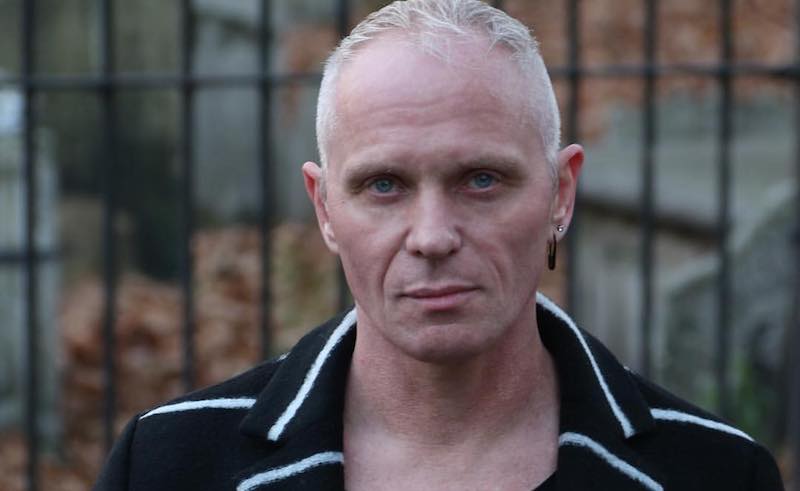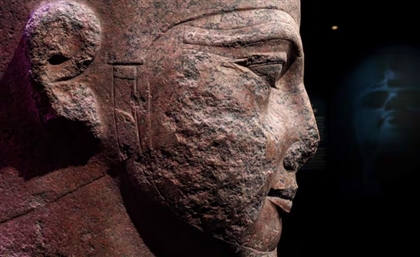Noise101: Mr. C
We interview Richard West, the man behind Mr. C, Sycophant Slags, Indigo Kidz, and East LA Tek.

London in the '80s, the Second Summer of Love and the rave movement that followed. Disco had previously taken over the world but at that time was giving way to a new sound. One group was responsible for challenging societal norms and a consequential sublimation of this previously unaccepted tradition, paving the way for the growth of the UK rave scene. In 1987 one DJ got his start and hasn't looked back since, switching from hip hop, to disco, to house and techno. And another development it seems is never too far off on the horizon.
Front man and lead rapper of The Shamen, one of the most successful bands in UK '90s pop culture. They released Ebeneezer Goode, a sly play on words that catapulted the song to the top of the UK charts. Known at the time as a vivacious rapper, a title that soon changed to pop star. Mr. C - original name Richard West - started out spinning disco records and getting paid for it when he was only 16 years old, but soon after his wide spread success with The Shamen he separated and started focusing more on his career as a house DJ - one that is as illustrious as they come.
It wasn’t long before he launched what was to become known as London’s best underground club, The End. He and partner Layo Paskin - from Layo & Bushwacka! - are said to be responsible for what many people note as the best nights of their lives. The End was also a record label called End Recordings and throughout its years released some of the most timeless tracks in dance music’s history.Now and for the past 15 years, Mr. C has been running Superfreq, his serial night in London, Los Angeles and beyond. After The End had to close down, Mr. C became a nomad with seasonal homes in places like Fabric London, where he throws Superfreq twice a year. His other residences include Dance 88/89 at Sankeys Ibiza; a night hailed by many as the best old school party on the island, running for 7 out of their 17 weeks of operations this summer.
This rapper, ex pop star, DJ, promoter, actor, radio presenter, and label owner - amongst many other professional titles - has played an influential role in the shaping of UK clubbing and rave history, continuing to deliver on an international level for many years whilst remaining true to his ‘cutting edge’ underground sound. One of the most toured DJs in the industry, he is a regular fixture in some of the hottest nights around the globe under his many monikers, including Sycophant Slags, Indigo Kidz, and East LA Tek, creating some of the hottest tracks I have personally heard in my life that are still being dropped years - decades even - after their release date.
15 years of Superfreq man, you took it all over the world. As a label and a party brand, what was the driving factor behind its globalisation? And was it your intention from the get go for it to blow up like it did?
As an international DJ myself of course I've used my own DJ bookings to push Superfreq as a brand and as a concept over the last 15 years. It’s important to have a brand that’s known at an underground level all around the globe as this provides a small platform to use as a springboard for new talent into the market. I’d always expected Superfreq to be well accepted as a touring underground event as the music and attitude will always remain the highest quality. Keeping Superfreq cutting edge and artistic is what’s most important.
We know that you still MC from time to time, we also know that you started out as a rapper and songwriter, becoming a pop star and topping the UK charts at number one with hit song "Ebeneezer Goode." When you decided to switch to DJing house records, was the transition hard? Did you play to the same audience at the time, or did your fan base take a hit after the move?
I do still MC occasionally but only on those special moments. I started DJing 30 years ago and haven’t stopped since so there was no switch or transition into DJing. There was a switch from being a DJ to being a pop star for a few years in the early 90s but I was still DJing, throwing events, making underground dance music using other names and also running my Plink Plonk label. The Shamen was still going when I opened The End club in London in December 1995 that went on to be one of the best clubs in the world for 13 years. Of course Mr. C as a DJ has a much smaller following of cutting edge music lovers than The Shamen did as a pop band.
 The Shamen circa 1992
The Shamen circa 1992
Since you were present from the beginnings of house music, what would your advice be to young promoters, DJs, club owners, and other people involved in underground entertainment in our region today on preserving the scene?
Sadly most promoters these days are glorified talent bookers and look for the most commercial talent to draw in the crowds. There is however a great global underground scene where promoters all over the world keep their parties small using local talent and more underground international names. Keeping this kind of integrity will help to preserve the essence of what this scene is meant to be about.
Of course there’s not a lot of money in throwing small underground events but if someone keeps their integrity in the way they book their talent and throw their events then there will be more longevity. DJs also have to make that choice and of course sadly most DJs, producers, clubs promoters and owners are likely to opt for taking the money and not care about the scene or cutting edge music. It’s all about choices. I’ve made mine.
Your project with Adultnapper - Sycophant Slags - released some of the most memorable dance music records I have personally heard, that continue to be played years after their release. Why did the project come to a halt with no releases since Anti Sailing?
Francis Harris AKA Adultnapper went in a very different direction with his productions opting to go for very slow and deep tunes for his Scissor and Thread label. Amazing music, but very different to what we were doing as the Sycophant Slags. We’re still very close so maybe the Slags will return one day. Please explain what an underground DJ means to you. What do the terms cutting edge and ‘tomorrow’s’ music mean in your dictionary?
I prefer to use the term cutting edge to underground as I’m not sure what underground is any more. The lines are so blurred. There’s many huge events happening playing underground music but if there’s thousands of people dancing to this music is it still underground? Using the word cutting edge is for me better as it describes the attitude behind the music, not its commercial value. If a DJ is playing 150 shows a year to huge crowds every time, even if his or her music is cutting edge, we can no longer call this underground. My own preference in music as a DJ is to play new music that sounds fresh, fun and mischievous. I don’t worry any more about what people want to call it.
At 88/89 Sankeys, you play classic Chicago and acid house tracks, and still keep that same distinct edgy feel that you maintain when playing more modern sets. Do the previous statements have anything to do with release dates or freshly produced music?
The attitude behind my sets has always been the same so if I’m playing an '80s acid house set, a '90s techno set or tech house set or a modern house, acid and techno set, it will always sound like me playing. It’s a feeling of what we’re all at a party for. So much electronic music is timeless and there’s certain tunes that went under the radar 25 years ago that sound like new tunes to the revelers dancing to them today.
You are involved in three labels. Do they all still release music? What are the unique differences to each one?
My first label was Plink Plonk, which I did with Paul RIP. We launched this label in 1992 and it was inspired by the late '80s acid house and techno scene. In the early '90s cutting edge house and techno were on the decline, so I launched Plink Plonk to help fill the gap and to create a platform for new talent from London as well as already known international producers. We had a concept of keeping the artists' identities a secret so that well known producers and new talent would all be judged on their music alone and the listener not influenced only by the name on the label. Plink Plonk was more of a Techno label than a house label but we did release both as that all came under this early '90s tech house attitude. Plink Plonk has subsidiary labels Lo Voltage and EAR too.My next label came after we opened The End Club. My partner in the club Layo Paskin and I started End Recordings, which was pretty much a tech house label and one of the leaders in the field. The first release was in December 1995, two days after we opened the club. The label went on to release monthly singles and some nice albums from myself and also Layo and Bushwacka! My current label that I run with my partner David Scuba over in Los Angeles is called Superfreq, which was launched in the mid 2000s to reflect the sound of the Superfreq nights, which it still does to this day. My new album Incidents is available now as well as the new single "Ripple Effect" with remixes from Marc Houle, Chloé and Noël Jackson. The first single "Stand Up" was released early summer and the third single "Shape Your Dreams" with remixes by Bushwacka, David Scuba, Banco De Gaia and Noël Jackson will be released in late November. We also have EPs from Noël Jackson and David Scuba about to be released.
Vinyl is making a huge comeback. DJs nowadays are picking up the medium for several reasons, including vinyl only releases. But some of them can’t mix properly using turn tables. As an old school DJ and dance music connoisseur, do you welcome the resurgence of vinyl at the expense of properly mixed sets? Or would you rather hear a properly mixed set with less exclusive releases?
If DJs can’t mix with vinyl they shouldn't bother trying in public. If they really want to play vinyl they should practice until they get it right like the rest of us had to. The solution is for those DJs to rip their vinyl to digital and play it as they normally would. I’d rather hear well-mixed sets that are spontaneous and fun and if that means staying away from vinyl for DJs without the talent then so be it. I’d rather they played digital.
Do you still write lyrics? Do you think the sneaky word play you guys pulled off with "Ebeneezer Goode" would cause a stir today as it did back then?
I do still write lyrics. Some of my new songs have vocals. I think if a new band wrote something as current and provocative now as "Ebeneezer Goode" then it would work. Who decides where Superfreq goes next? Does someone have to book the show? Or do you plan the touring yourself?
Clubs can book Superfreq. I do my own events in London and Los Angeles as these are my hometowns, but most other places we have a host for Superfreq.
And finally, any plans on bringing the brand to the Middle East any time soon?
Sadly I don’t have any plans to come to the Middle East soon. I’d love to do Superfreq in Egypt and Lebanon. Let's hope it happens soon.
Follow Mr. C on Facebook here and follow him out on SoundCloud for more tunes.
*Main image by Normski Photography
- Previous Article Why Cairo is Freaking Out Over Kazaz
- Next Article Meet the Egyptian Filmmaker Behind Our First Indie Feature in Cannes






















